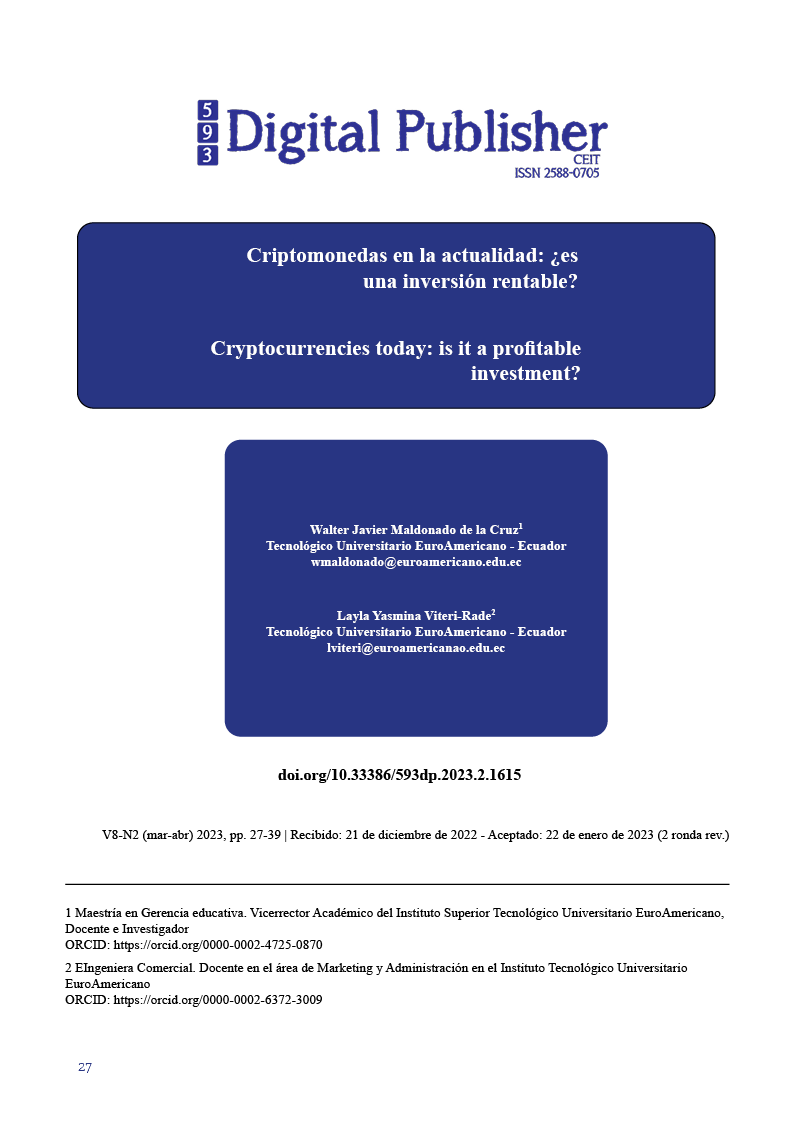Cryptocurrencies today: is it a profitable investment?
Main Article Content
Abstract
The objective of this research is based on evaluating the state of cryptocurrencies today and the advantages or disadvantages that they have, in order to understand if the investment of cryptocurrencies is viable and profitable. All this through a non-experimental investigation, descriptive and cross-sectional because an investigation is carried out in a certain time, it is also quantitative because through the analysis carried out on the study population it is expected to have the expected results. The evolution of money and the growth of cryptocurrencies arise from the need to be able to have a more effective, fast and efficient means of exchange for transactions, although it is true that there are different types of money in the world, the idea is achieve globalization of a new monetary system that allows transactions to be generated at lower costs, and that said funds are not manipulated by the government or any financial entity. In conclusion, it is mentioned that, from the investment point of view, it is important to consider and evaluate that, the higher the profit, the greater the risk that the investment may not bear the expected results, however, this reason should not be impediment to not invest in a project that can generate profits. For Ecuador, since it is not legal as a currency, it is important to consider the rules and precautions to carry out any transaction, and that is that when making a transfer it is settled quickly compared to other traditional banking transactions, and with only having a computer With the internet or a cell phone, you can invest in cryptocurrencies, taking into account the possible risks.
Key words: cryptocurrency, investment, risk, transactions
Downloads
Article Details

This work is licensed under a Creative Commons Attribution-NonCommercial-ShareAlike 4.0 International License.
1. Derechos de autor
Las obras que se publican en 593 Digital Publisher CEIT están sujetas a los siguientes términos:
1.1. 593 Digital Publisher CEIT, conserva los derechos patrimoniales (copyright) de las obras publicadas, favorece y permite la reutilización de las mismas bajo la licencia Licencia Creative Commons 4.0 de Reconocimiento-NoComercial-CompartirIgual 4.0, por lo cual se pueden copiar, usar, difundir, transmitir y exponer públicamente, siempre que:
1.1.a. Se cite la autoría y fuente original de su publicación (revista, editorial, URL).
1.1.b. No se usen para fines comerciales u onerosos.
1.1.c. Se mencione la existencia y especificaciones de esta licencia de uso.
References
Acuña, H. (2018). Cuadernos CEF/N°2 Criptomonedas, aplicaciones potenciales de blockchain y desafíos regulatorios. ESE Businnes School. Obtenido de https://www.ese.cl/ese/site/artic/20181030/asocfile/20181030144442/cuaderno_2_cef__acu__a__2018__criptomonedas__aplicaciones_potenciales_de_blockchain_y_desaf__os_regulatorios.pdf
Asamblea Nacional. (2014). Códogo Orgánico Monetario y Financiero. Quito. Obtenido de https://www.bce.fin.ec/index.php/boletines-de-prensa-archivo/item/669-codigo-monetario-y-financiero
Asto, N., & Villavicencio, M. (2019). ¿Las criptomonedas deben ser consideradas dinero? Universidad Peruana de Ciencias Aplicadas. Obtenido de http://hdl.handle.net/10757/626341
Ayón, M., Bermúdez, A., Morán, K., & Marcillo, M. (Mayo-Agosto de 2021). Riesgos y responsabilidad que conlleva la implementación de las criptomonedas en Ecuador. UNESUM-Ciencias: Revista Científica Multidisciplinaria, 5(3), 105-112. Obtenido de https://revistas.unesum.edu.ec/index.php/unesumciencias/article/view/427/338
Borja, N. (2022). Origen y definición de las criptomonedas: El Bitcoin y los Non Fungible Tokens. Universidad de Oviedo. Obtenido de http://hdl.handle.net/10651/63518
Cadena, P., & Rincón, H. (2018). ¿Qué son las criptomonedas? Universidad La Gran Colombia. Obtenido de http://hdl.handle.net/11396/4657
Chávez, P. (2019). Naturaleza jurídica de las criptomonedas. Revista de Derecho Universidad San Sebastián, 65-81. Obtenido de http://derechoygobierno.uss.cl/index.php/rduss/article/view/344/283
Congreso Nacional. (2000). Ley Orgánica de Defensa del Consumidor. Obtenido de http://www.registroficial.gob.ec/
Contreras, B. (06 de Julio de 2021). ¿Cómo empezar a invertir en criptomonedas sin ser un experto? Obtenido de https://talcualdigital.com/como-empezar-a-invertir-en-criptomonedas-sin-ser-un-experto/
Cuenca, A. (2021). Bitcoin y Criptomonedas, ¿La nueva forma de dinero? Bolivia y Latinoamerica en un entorno globalizado. Universidad Mayor de San Andres. Obtenido de http://repositorio.umsa.bo/xmlui/handle/123456789/27301
de Grado de Andrés, J. (2022). Acercamiento a las criptomonedas como método de inversión. Universidad de Valladolid. Obtenido de https://uvadoc.uva.es/handle/10324/54474
Domingo, C. (2018). Todo lo que querias saber sobre Bitcoin, criptomonedas y blockchain y no te atrevías a preguntar. España: Planeta, S.A. Obtenido de https://pladlibroscl0.cdnstatics.com/libros_contenido_extra/38/37925_Bitcoin_Criptomonedas_Y_Blockchain.pdf
El Universo. (9 de Noviembre de 2021). En Ecuador, el bitcoin es considerado moneda digital de alto riesgo. Obtenido de https://www.eluniverso.com/noticias/economia/criptomonedas-bancos-centrales-flar-fmi-economia-pandemia-junio-2021-nota/
Erazo, C. (2022). Las imversiones en la economía ecuatoriana: un análisis de las criptomonedas como nuevo tipo de commodity. Guayaquil: Universidad de Guayaquil. Obtenido de http://repositorio.ug.edu.ec/handle/redug/62002
Espinoza, K., & Pazmiño, W. (2021). Plan de inversión en hardware de minería de criptomonedas en Ecuador 2021. Guayaquil: Universidad de Guayaquil. Obtenido de http://repositorio.ug.edu.ec/handle/redug/58315
Fernández, R. (18 de Noviembre de 2022). Criptodivisas más valiosas a nivel mundial en noviembre de 2022. Obtenido de https://es.statista.com/estadisticas/657235/monedas-virtuales-mas-valoradas-a-nivel-mundial/
Gallegos, J. (2019). Marco legal respecto del uso de criptomonedas en Ecuador. Obtenido de https://gvn.com.ec/2021/08/25/marco-legal-criptomonedas/
Instituto Nacional de Estadística y Censos, INEC. (2010). Información Censal. Obtenido de Población por grupos de edad, según provincia, cantón, parroquia y área de empadronamiento: https://www.ecuadorencifras.gob.ec/informacion-censal-cantonal/
La Hora. (18 de Octubre de 2021). Ecuador debe permitir el uso del bitcoin, pero alejarse del modelo de El Salvador . Obtenido de https://www.lahora.com.ec/pais/criptomonedas-bitcoin-uso-ecuador/
Martín, C. (2022). Criptomonedas. Segovia: Universidad de Valladolid. Obtenido de https://uvadoc.uva.es/handle/10324/54475
Medina, J. (2022). Dinero electronico como estrategia comercial. Universidad de Guayaquil. Obtenido de http://repositorio.ug.edu.ec/handle/redug/59381
Moreno, C. (2021). Las criptomonedas. Sevilla: Universidad de Sevilla. Obtenido de http://hdl.handle.net/11396/4657
Moreno, M. (2020). Origen, Evolución y problemas del dinero hasta las criptomonedas. Universidad Rey Juan Carlos.
Muñoz, C. (2015). Metodología de la investigación. México: Oxford University Press México S.a.
Navarro, M. (2021). La teoría económica y la moneda. Universidad de la Guajira. Obtenido de https://www.academia.edu/download/59137104/LA_TEORIA_ECONOMICA_Y_LA_CRIPTOMONEDA20190505-110766-1eh9h3f.pdf
Orellana, R. (16 de Noviembre de 2022). Criptomonedas: en qué países son legales y dónde están prohibidas. Obtenido de https://es.digitaltrends.com/tendencias/criptomonedas-legales-prohibidas/
Palella, S., & Martins, F. (2010). Metodología de la investigación cuantitativa. Caracas: FEDUPEL, Fondo Editorial de la Universidad Pedagógica Experimental Libertador.
Quintuña, C., & Sánchez, J. (2021). Análisis de las incidencias del uso de criptomonedas como método de pago para las exportaciones ecuatorianas. Universidad de Guayaquil. Obtenido de http://repositorio.ug.edu.ec/handle/redug/59693
Raisin GmbH. (2022). ¿Es rentable invertir en criptomonedas? Obtenido de https://www.raisin.es/inversion/rentable-invertir-criptomonedas/#:~:text=Son%20un%20instrumento%20altamente%20rentable,ser%20falsificada%2C%20manipulada%20o%20cambiada.
Torres, J. (2019). Criptomonedas, qué son, cómo utilizarlas y por qué van a cambiar el mundo. España: Editorial Planeta S.A . Obtenido de https://planetadelibrospe0.cdnstatics.com/libros_contenido_extra/42/41659_Criptomonedas.pdf



